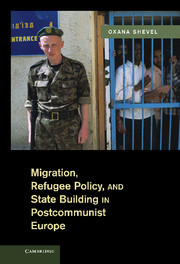1 - Postcommunism, Nationalism, and Refugees
Published online by Cambridge University Press: 25 October 2011
Summary
Before 1989, virtually no refugees went to Eastern Europe. The Soviet Union and its East European satellites produced waves of political refugees but received almost none. As communist regimes crumbled, the western media, analysts, and politicians predicted a mass exodus from the former communist bloc to the West. On the eve of the USSR’s dissolution in the winter of 1991, estimates of the number of Soviet citizens likely to head westward ranged from two to thirty million. By the second half of the 1990s, however, it became clear that, with the exception of the former Yugoslav states ravaged by war, citizens of postcommunist countries were not flooding Western Europe. Of the 4.2 million asylum applications received in Western Europe in 1990–1999, only 0.5 percent (196,600) were submitted by citizens of the former Soviet Union, and even fewer were submitted by citizens of Central European states. Most postcommunist states not only did not become major refugee producers for the West, but instead attracted thousands – and, in some countries, millions – of refugees and other displaced persons. By the end of the 1990s, postcommunist states hosted 6.4 million refugees and involuntarily displaced persons – a whopping 29 percent of the world’s total and 73 percent of Europe’s total. Armenia, Azerbaijan, Georgia, Russia, and Ukraine hosted more displaced persons than any Western European country except Germany.
Formation of a refugee protection regime is an element of the democratization process. As the Rapporteur of the Council of Europe’s Committee on Migration, Refugees remarked, “no state which calls itself genuinely democratic can refuse to face up to its responsibilities in terms of protecting persecuted persons.” This book is the first systematic comparative treatment of the politics of refugee admission policy in the postcommunist region that focuses on an intriguing puzzle the region presents: economically and politically similar postcommunist states, faced with a refugee problem similar in nature and size, and the same international legal standards for dealing with refugees, responding differently – some being more receptive to refugees than others; some privileging certain refugee groups while others treated all refugees equally. The Czech Republic and Poland, and Russia and Ukraine, the four cases examined in this book, are two pairs of cases exemplifying this puzzling variation. The Czech Republic proved to be more receptive to refugees than Poland. Russia and Ukraine also responded differently to a similar refugee problem. There was a more receptive policy toward refugees from the developing world in Ukraine compared to Russia, and preferential treatment of coethnic refugees in Russia but not in Ukraine.
- Type
- Chapter
- Information
- Publisher: Cambridge University PressPrint publication year: 2011



